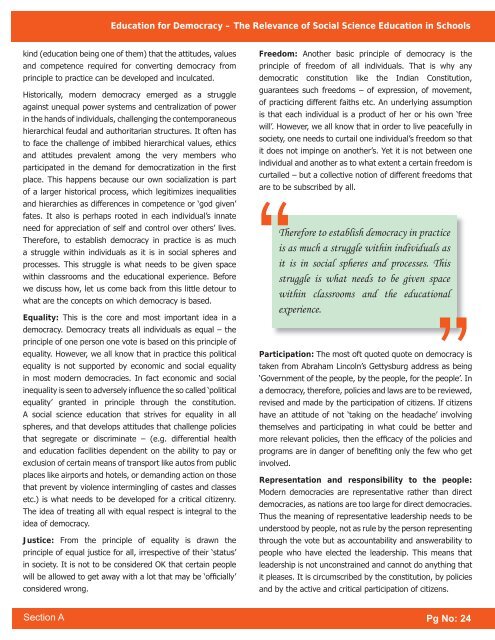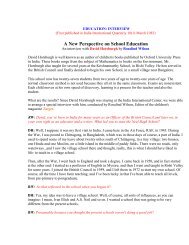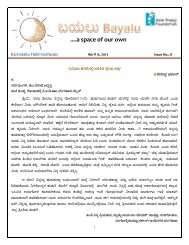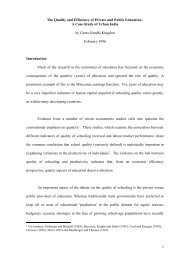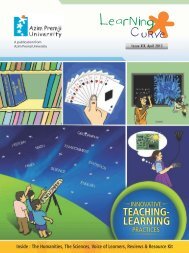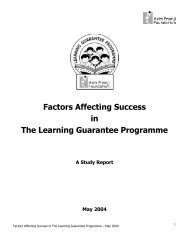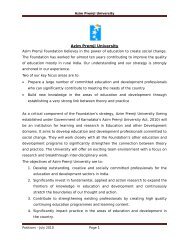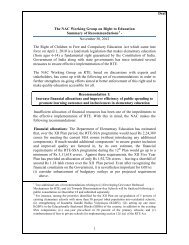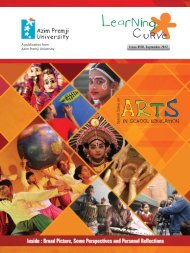Indesign Pagesnew.indd - Azim Premji Foundation
Indesign Pagesnew.indd - Azim Premji Foundation
Indesign Pagesnew.indd - Azim Premji Foundation
You also want an ePaper? Increase the reach of your titles
YUMPU automatically turns print PDFs into web optimized ePapers that Google loves.
kind (education being one of them) that the attitudes, values<br />
and competence required for converting democracy from<br />
principle to practice can be developed and inculcated.<br />
Historically, modern democracy emerged as a struggle<br />
against unequal power systems and centralization of power<br />
in the hands of individuals, challenging the contemporaneous<br />
hierarchical feudal and authoritarian structures. It often has<br />
to face the challenge of imbibed hierarchical values, ethics<br />
and attitudes prevalent among the very members who<br />
participated in the demand for democratization in the fi rst<br />
place. This happens because our own socialization is part<br />
of a larger historical process, which legitimizes inequalities<br />
and hierarchies as differences in competence or ‘god given’<br />
fates. It also is perhaps rooted in each individual’s innate<br />
need for appreciation of self and control over others’ lives.<br />
Therefore, to establish democracy in practice is as much<br />
a struggle within individuals as it is in social spheres and<br />
processes. This struggle is what needs to be given space<br />
within classrooms and the educational experience. Before<br />
we discuss how, let us come back from this little detour to<br />
what are the concepts on which democracy is based.<br />
Equality: This is the core and most important idea in a<br />
democracy. Democracy treats all individuals as equal – the<br />
principle of one person one vote is based on this principle of<br />
equality. However, we all know that in practice this political<br />
equality is not supported by economic and social equality<br />
in most modern democracies. In fact economic and social<br />
inequality is seen to adversely infl uence the so called ‘political<br />
equality’ granted in principle through the constitution.<br />
A social science education that strives for equality in all<br />
spheres, and that develops attitudes that challenge policies<br />
that segregate or discriminate – (e.g. differential health<br />
and education facilities dependent on the ability to pay or<br />
exclusion of certain means of transport like autos from public<br />
places like airports and hotels, or demanding action on those<br />
that prevent by violence intermingling of castes and classes<br />
etc.) is what needs to be developed for a critical citizenry.<br />
The idea of treating all with equal respect is integral to the<br />
idea of democracy.<br />
Justice: From the principle of equality is drawn the<br />
principle of equal justice for all, irrespective of their ‘status’<br />
in society. It is not to be considered OK that certain people<br />
will be allowed to get away with a lot that may be ‘offi cially’<br />
considered wrong.<br />
Section A<br />
Education for Democracy – The Relevance of Social Science Education in Schools<br />
Freedom: Another basic principle of democracy is the<br />
principle of freedom of all individuals. That is why any<br />
democratic constitution like the Indian Constitution,<br />
guarantees such freedoms – of expression, of movement,<br />
of practicing different faiths etc. An underlying assumption<br />
is that each individual is a product of her or his own ‘free<br />
will’. However, we all know that in order to live peacefully in<br />
society, one needs to curtail one individual’s freedom so that<br />
it does not impinge on another’s. Yet it is not between one<br />
individual and another as to what extent a certain freedom is<br />
curtailed – but a collective notion of different freedoms that<br />
are to be subscribed by all.<br />
Therefore to establish democracy in practice<br />
is as much a struggle within individuals as<br />
it is in social spheres and processes. This<br />
struggle is what needs to be given space<br />
within classrooms and the educational<br />
experience.<br />
Participation: The most oft quoted quote on democracy is<br />
taken from Abraham Lincoln’s Gettysburg address as being<br />
‘Government of the people, by the people, for the people’. In<br />
a democracy, therefore, policies and laws are to be reviewed,<br />
revised and made by the participation of citizens. If citizens<br />
have an attitude of not ‘taking on the headache’ involving<br />
themselves and participating in what could be better and<br />
more relevant policies, then the effi cacy of the policies and<br />
programs are in danger of benefi ting only the few who get<br />
involved.<br />
Representation and responsibility to the people:<br />
Modern democracies are representative rather than direct<br />
democracies, as nations are too large for direct democracies.<br />
Thus the meaning of representative leadership needs to be<br />
understood by people, not as rule by the person representing<br />
through the vote but as accountability and answerability to<br />
people who have elected the leadership. This means that<br />
leadership is not unconstrained and cannot do anything that<br />
it pleases. It is circumscribed by the constitution, by policies<br />
and by the active and critical participation of citizens.<br />
Pg No: 24


